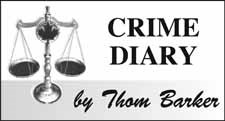Joseph Blerot (aka Gerald Blerot) is not your run-of-the-mill tax cheat.
Last week, the 60-year-old was sentenced at Yorkton Court of Queen's Bench to three years and nine months in jail for evading paying taxes and counseling others to so the same.
An interesting enough case in and by itself, what was really intriguing about it was the defence (or lack of defence) he tried to employ, the "natural person" defence.
During the proceedings against him dating to August 2011, Blerot refused to acknowledge the authority of the court and did not participate in the trial except to occasionally submit motions in an attempt "to establish that as a natural person with inherent jurisdiction, the Crown had no ability to continue the prosecution against him," according to Justice Ronald Mills.
This is a growing phenomenon in North America, people who believe, or profess to believe for financial gain, that governments are illegitimate. In addition to "natural persons," they variously call themselves "sovereign citizens", "freemen-on-the-land" or "constitutionalists."
According to the FBI, these are not organized groups, but loosely-affiliated individualists whose activities range from "quirky" to domestic terrorism. It is estimated there may be up to 30,000 people in Canada and 10 times that in the U.S. who adhere, to varying degrees, to the philosophy.
Frequently, their activities seem downright contradictory. For example, while Blerot refused to recognize the Court's jurisdiction in his tax evasion trial, he is only too happy to use the justice system when it serves his own purposes.
In 1997, Blerot was arrested for assault after he attempted to make a citizen's arrest in the Legislature on John T. Nilson, then Saskatchewan minister of justice and attorney general.
Blerot alleged the minister had committed breach of public trust by instructing "his agent, Marylynne Beaton, to direct the clerk of the court to make an entry on the record that proceedings against Conrad D. Hadubiak, accused, were stayed by his discretion without just cause or lawful grounds resulting in an abuse of discretion and an abuse of public trust."
Blerot himself had sworn the breach of trust information against the minister, but had been unable to get a judge or justice to order Nilson to appear before the Court to answer the allegation.
The judge in the assault case, dismissed the defence that the accused had the right under section 494 of the Criminal Code to make a citizen's arrest and use whatever force was necessary and reasonable to do so.
The judge also rejected Blerot's secondary defence that the assault information against him was invalid because his name was printed in lower case on his birth certificate and all in upper case on his driver's licence (i.e. they had arrested the wrong guy). "The court can reject this position outright as having no basis in law whatsoever," the judge wrote.
This is another typical tactic employed by natural persons, trying to find administrative technicalities to invalidate prosecutors' cases. They also file prodigious numbers of frivolous lawsuits and liens against public officials to intimidate and clog up the court system.
In an attempt to have many of these litigations recognized by the courts, sovereign citizens draw up bogus documents and try to have them notarized by law firms or notary publics, which can lead to legal liabilities for the lawyers or notaries who witness them.
While a lot of what these individuals do ends up being more nuisance than anything else, at the extreme end of the spectrum they can be downright dangerous. I wrote about a case last year ("Mundane case produces must-read decision," Yorkton This Week, April 10, 2013) in which a routine traffic stop in Grimsby, Ontario led to an altercation between a self-proclaimed freeman-on-the-land and police.
Far worse was a traffic stop in Arkansas where two state police officers were gunned down by a 16-year-old sovereign citizen extremist with an AK-47 assault rifle.
The threat of incidents like this happening in Canada is probably not as grave, but people in legal professions are starting to take it seriously. In a 2012 Law Society of British Columbia publication, Dave Bilinsky, a practice management advisor, recommended implementing a workplace security plan.
The Canada Revenue Agency also takes it very seriously and used Blerot's sentencing last week to send a message to potential tax cheats:
"The Canada Revenue Agency warns all Canadians to beware of individuals that try to convince you that Canadians do not have to pay tax on the income they earn," a CRA news release stated.
"These individuals, also known as tax protesters, not only fail to report their own earnings, but they also conspire, counsel, and promote these tax schemes. Canadian courts have repeatedly and consistently rejected all arguments made in these tax protester schemes. For those involved in tax protester schemes, the CRA will reassess income tax and interest, and charge penalties. In some cases, these individuals will be prosecuted for tax evasion. If convicted, they could face significant fines and possibly jail time."




